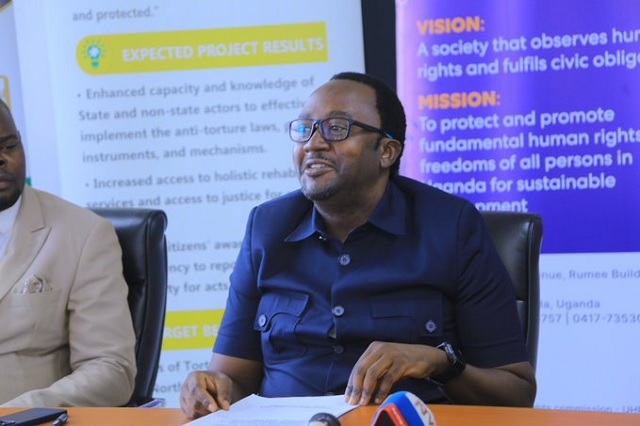
Kampala, Uganda | THE INDEPENDENT | The Uganda Human Rights Commission has expressed worry about failure by the Uganda Police to tackle case of torture. The commission says the failure has contributed to a troubling pattern of torturers going free.
Crispin Kaheru, a member of the commission says the lack of information about torture in the police annual crime reports indicates that the institution might not be concerned about this issue.
“Police must not treat torture lightly. It violates human rights and has no place in any form. Law enforcement should investigate all torture cases, whether involving their own officers or others. Torture is a criminal act,” Kaheru said.
Kaheru made the remarks during a joint press conference by the Uganda Human Rights Commission and the African Centre for Treatment and Rehabilitation of Torture Victims, ahead of the UN International Day in Support of Victims of Torture, observed every June 26th.
Torture is absolutely and strictly prohibited by laws in Uganda. Yet, the African Centre for Treatment and Rehabilitation of Torture Victims (ACTV) in Uganda each year receives an average of 1,000 testimonies from Ugandans who allege to have been subjected to acts of torture and ill-treatment.
According to the police crime report of 2023, there was no specific crime category labeled “torture.” Instead, instances of torture were reported as part of child abuse, with 866 cases recorded. Although torture is not explicitly categorized, it is possible that it was recorded under other classifications.
However, the Uganda Human Rights Commission documented 141 such cases last year. Over the period from 2016 to 2018, the UHRC registered a total of 1,032 cases of torture and ACTV reported 6,230 cases of torture between 2016 and 2020.
“We acknowledge that gaps exist in effective documentation and investigation of cases of torture. we observe police reports from 2021 to 2023 didn’t report any compliant of torture received against either private adult citizen adult citizens or sister security agencies,” said Samuel Nsubuga, CEO of the African Centre for Treatment and Rehabilitation of Torture Victims.
Kaheru further noted that the commission has discovered a troubling trend: despite police neglect of this crime, victims are reluctant to report torture cases to law enforcement. This reluctance stems from the perception that the police, including its CID department, are among the primary documented perpetrators of such acts.
“Victims of torture often hesitate to report their ordeal due to fear of retaliation or lack of faith in the investigative process,” stated Kaheru. “It is alarming to see how these cases are being neglected, allowing perpetrators to evade accountability.”
However, even private individuals have been reported to be torturing others. For example, Nsubuga, noted that their reports indicated 103 complaints in 2018, 394 in 2019, 104 in 2020, 166 in 2021, 136 in 2022, and 150 in 2023, totaling 1,053 complaints against individuals. “This calls for more civic education and sensitization targeting the public, as well vigilance by police to enforce the law,” he added.
Kaheru emphasized on the same platform that while Uganda has made strides in combating all forms of torture, these efforts are undermined by impunity, especially within security agencies, where perpetrators often feel immune from consequences.
However, he highlighted that if Ugandans unite, they can devise methods to ensure that even those who consider themselves untouchable face the full force of the law. He added the general public has shown interest in reporting these crimes using social media.
“The capturing of such video and the attention they normally attract coupled with the increasing number of online users who dedicate their platforms to highlighting human rights violations in general…it is a wakeup call to all duty bearer and other human rights activists to give these the due attention,” Kaheru added.
The UHRC’s Director of Education, Kamadi Byonabye noted that while the commission received multiple cases, insufficient money prevented them from looking into them
. “The irony is that many reported cases to the commission went uninvestigated for various reasons, with funding being the major constraint,” Byonabye said.
URN has verified that of the 141 documented cases of torture, the commission was only able to look into 6. The commission has repeatedly stated that a lack of funding prevents it from carrying out its duty.
They reportedly only get paid 100 million shillings to look into every issue that is brought to their attention across the country.
In meantime, The UN International Day in Support of Victims of Torture will be observed at Kampala’s Railway Grounds this year. In addition to other events, there will be a marching procession led by Minister of Internal Affairs General Kahinda Otafire, who will serve as the chief walker.
Torture remains the most violated human right in Uganda according to the Uganda Human Rights Commission.
Articles 24 and 44 of the Ugandan Constitution prohibit torture. Uganda made the Convention against Torture part of national legislation by enacting the Prevention and Provision of Torture Act of 2012 and its regulations in 2017.
Uganda ratified the Convention against Torture. However, it has not ratified the Optional Protocol to the Convention against Torture (OPCAT). Ratifying OPCAT would make it mandatory for Uganda to establish a National Preventive Mechanism (NPM)
*****
URN
 The Independent Uganda: You get the Truth we Pay the Price
The Independent Uganda: You get the Truth we Pay the Price



